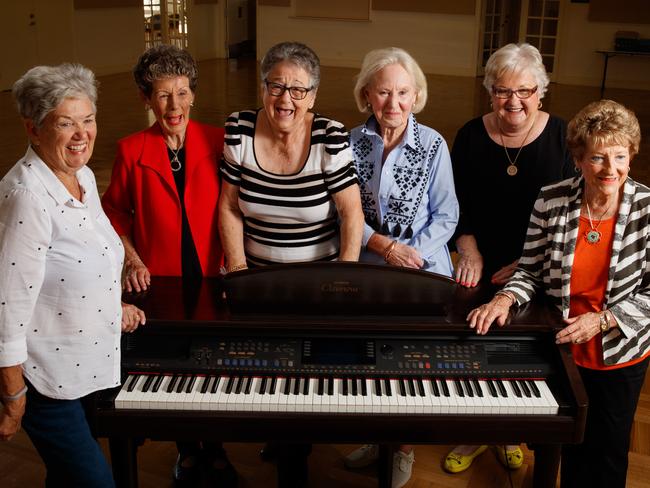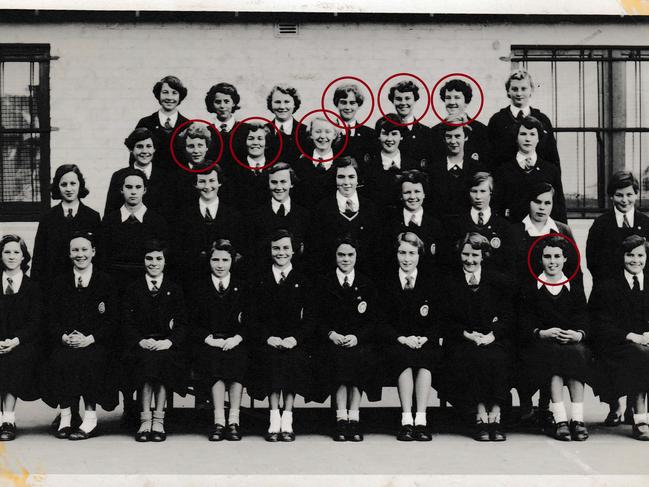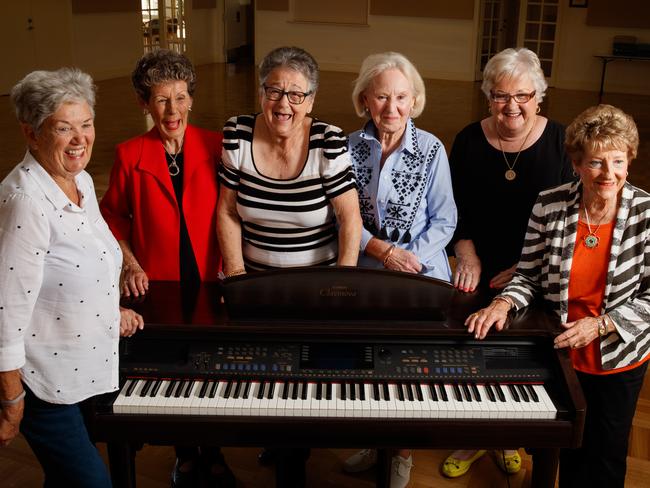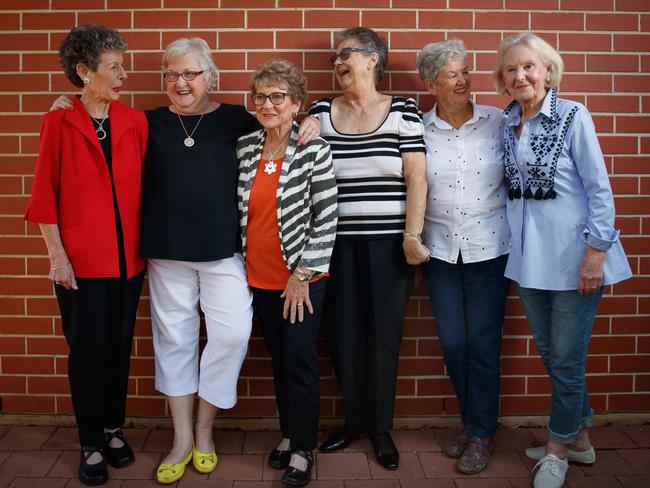The secret to seven decades of friendship
EIGHT girls met at Woodville High School and, more than 70 years later, those who are left still catch up regularly to enjoy each other’s company, share memories and laughter... lots of laughter.

SA Weekend
Don't miss out on the headlines from SA Weekend. Followed categories will be added to My News.
IT reads like a novel, the Famous Five adventure that Enid Blyton didn’t have time to write. A group of girls meet at school, decide to become friends, stay friends, go on some awfully big adventures, marry, have children (me included), work, retire and, finally, stop to survey the years and say, “Has it been that long?”
This is the story of my mum, Judy Orr, her friends, and a long lunch that has lasted for more than 70 years. A sort of hymn to family values, and Bob Byrne-style nostalgia that hasn’t always been nostalgic.

More, people’s lives, lived (the ups and downs, good and bad, screw-ups and triumphs), pulled apart and put back together. A story of shared sandwiches, children, husbands, life and death. The big themes. A succession of ordinary moments no one’s noticed, adding up to this extraordinary biography. And here, all these years later, the sum of several lives, encapsulated in a book the girls read in the 1940s. Winnie-the-Pooh looking back at life, as it passes under the bridge, and saying: “Sometimes , if you stand on the bottom rail of a bridge and lean over to watch the river slipping slowly away beneath you, you will suddenly know everything there is to be known.”

Okay, so each story needs a beginning. January, 1945. A hot day. A world away, Hitler is bunkering down, the Russians are descending on Berlin, the Americans are putting the finishing touches to their bomb. Duke Ellington on the radio, the Don settled into his new Kensington house, Tom Playford seven years into his equally long-lasting term, Lance Hill planning a hoist factory and, down at Pennington, the new kids lining up for school: Judy Savage (the future Mrs Orr), Elaine Hastings, Shirley Stevens and Wendy Whitmarsh. And later, when the girls started high school, another four friends: Margaret Thomson, Trish Gurner, Marlene Allen and Val Brenton, whose death some years ago was the first concession to the passing years.
Fast forward more than seven decades. A Subway platter arrives, coffee is brewed and the best china put out. The girls are having their monthly lunch at my mum’s retirement home (sorry, lifestyle village) and I stop by. Not at all staged, because all of this was going on years before I was ever thought of.
Firstly, I want to know the secret. In a world of short, sharp and brutal relationships, high divorce rates, isolation and social disconnect, what’s the secret to seven decades (plus) of friendship? My mum (okay, Judy) explains that, “We’ve all cared about one another. If anyone gets sick … we’re all there. The network works.”
Anyway, this all seems simple. If you want friends, care about them. Although, maybe we all need reminding of this. This sentiment is shared. Through a succession of stories (seven voices talking over each other, creating a white noise only they seem to be able to decipher). I mention this (as the recorder pulses) but it keeps returning. Like there’s a language, or at least dialect, only they understand. Still, I persevere. It seems this whole caring concept is quite simple.
Lesson Two: You need to be interested in other people’s lives. Judy, again: “And then I met my friends Elaine Hastings and Shirley Stevens and Wendy Whitmarsh, and we were born together. [Well, you know: not together]. I taught Elaine how to read but she was hopeless. And she taught me how to add up.”
Lesson Three: No pulling punches. As Elaine explains: “Me and Judy sat together right through Grade Seven.” [Judy interjects: “We weren’t brilliant scholars, were we?”] “We used to cheat like mad. I used to do the adding up and she used to do the reading.” Lesson Four: Be honest with yourself.
All of this explains, but doesn’t explain. Plenty of friendships start this way, but how do they last? Maybe, I wonder, it gets back to shared values (Lesson Five). Elaine explains that, “We never had a lot. We were quite poor, because my dad didn’t work for two years. We were happy to go to each other’s places. We rode our bikes everywhere.” Lesson Six: You don’t actually need a lot of stuff to be happy. In fact, maybe the opposite’s true? Maybe that’s why we’ve got problems?
Margaret, sitting in the sun, caught up in the memories, agrees. “We were all hard-working people and our mothers could put food on the table but I can remember in third year I had to go home and mend my uniform because it was worn so thin and we couldn’t afford to buy a new one.” A trope that recurs throughout our lunch.
Togetherness. Is that it? The slow drifting apart of streets and neighbourhoods, the high fences and security systems, as we all grow afraid of each other. Judy explains that “the neighbourhood was wonderful”.
“We all played together and we came in at nine o’clock at night and our parents wouldn’t even care less because they knew that we were safe.” (Lesson Seven: Stop fretting, no one’s out to get you.) People were happy with each other’s company. At Pennington “we didn’t have a canteen. We used the corner shop. I’d bring these girls home at lunch and we’d sit under the vines and have our lunch.” Escaping their small primary school, chockers with immigrants from the Baltic States. A no-nonsense school “with no mucking around with computers, we didn’t have any drugs … and we grew up wonderful”.
About now, the white noise of shared memories returns. Someone asking about the first supermarket (“Tom the Cheaper, was it, in 1962?”). Something about people growing their own vegetables, there was no packet stuff, you made your sauces, preserves, bleeding into my mum telling the group: “My mum had a pressure cooker and the lid blew off and food ended up all over the ceiling.” More laughter. Lesson Eight: You may as well laugh. Some of these memories intersect my own, the grandson staying with his Nan and Pop in the Burleigh Ave home my mum grew up in. The sound of the milkie’s horse, the smell of roses, and lamb and mint, drifting down people’s hallways and out into mock orange gardens, cat-piddle rosemary and wisteria. Maybe this is the nature of memory? The longer you go, the more selective, until, around 80, you’re left with a sort of highlights reel, set to a Perry Como or Acker Bilk track.

Lesson Nine: Those who play together, stay together. The story of these 12 and 13-year-old girls packing a picnic lunch and cycling from Pennington to the wilds of Tea Tree Gully. Eating lunch beside a creek and riding home. Proto-feminists showing the blokes how it should be done.
Or Trish, telling me, “We used to ride [our bikes] up and down Torrens Rd and meet all the girls.” Elaine explaining, “I remember me and Judy going to the Show one year and we wanted a Polly Waffle. We didn’t have enough money so we bought one between us. We broke it in half, and there was cream everywhere. Every time I walk through those gates I remember.”
And then we were six, seven, and then came life. High school, jobs, taking the girls in separate directions, but never very far. Margaret explains: “I went off to work in a bank. Mum said, ‘You’ve done your schooling, where would you like to work?’ I said a bank, and she took me in a train and said, ‘Which one would you like to go to?’ I said, ‘National Bank’, and I got a job. We all got jobs very easily.” I think there’s a lesson here (No. 10).
Sometimes what you need is closer to home than you think. When Elaine had to leave school for a hairdressing apprenticeship, she was horrified. “How was I going to live without these girls? That was the main thing. I wouldn’t see my girls anymore. I cried for days.” But times were simpler. As Margaret tells me, “It was a sign of the times that you could still work in a factory and you just went to Intermediate [Year 10]. That was enough.”
Jobs, affordable housing, banks helping people. What sort of strange world was this? One before downsizing, efficiency dividends, globalisation and the insecurity, fear and general social wonkiness that’s been part of our drive for profit, wealth and a better standard of living that isn’t really better. My mum tells me her dad, Jack Savage, “worked in the Adelaide Chemical Works and through the Depression he was never put off, luckily, and there was no hardship there. That’s when the friendships began … when we were five.”
Although now we are closer to 80.
The girls have worked to keep their sense of childhood, of trust, of love. To give this up, would be to lose everything. And it’s taken work to keep the group going. Shirley, for instance, a key member, off sick today, unable to attend. The girls ask if we should ring her, talk to her, and I’m warned, whatever I do, include her in the story. I ask if the group has grown to include other friends they’ve made over the years. No. No interlopers. Referring to their annual country trip, my mum explains: “We’ve had some amazing times together. We’d go everywhere. We’d all get drunk.” And regarding their monthly lunch: “No husbands! Girls only!”
The Subway’s nearly gone, the coffee’s cold, and I tell the girls I’m still not sure how they’ve done it. No arguments, disagreements, no one taking offence, misunderstanding, jealousy, none of this. What happened to the world? My mother explains that “it’s something unique”.
Elaine agrees. “When I tell people in the village, they say, ‘Come on, that was 70-odd years ago’. They don’t believe it.”
As the blur of memories returns. Trish (who met the girls in 1950) riding up Torrens Rd with Wendy and the others; Margaret, catching the stream train from Largs North to Woodville High. “First Year was a great year with Mrs Bray, she was a great teacher, very young …”
Elaine offers advice for the next generation. “We were all tolerant of each other. We [didn’t] take offence. (Lesson 11: Don’t be so precious.) Margaret describes a bond I’m only beginning to understand. “Recess time, or any break, you’d go out and you might’ve been by yourself in the classroom, but they were there.”
In short, the network works. I’m told you have to find people you like, and stick with them. None of this idea of “always doing better”. The river is always passing beneath us, and we have no way of stopping it, but in the few voices, the memories, the bonds, comes some understanding of what really matters. As Pooh explains: “If there ever comes a day when we can’t be together, keep me in your heart. I’ll stay there forever.”


